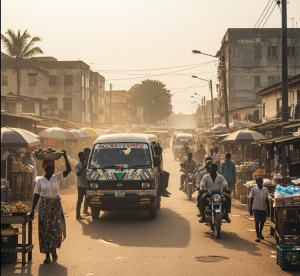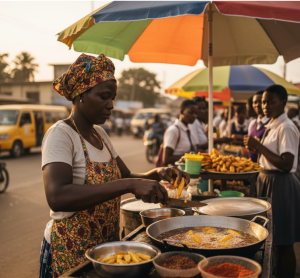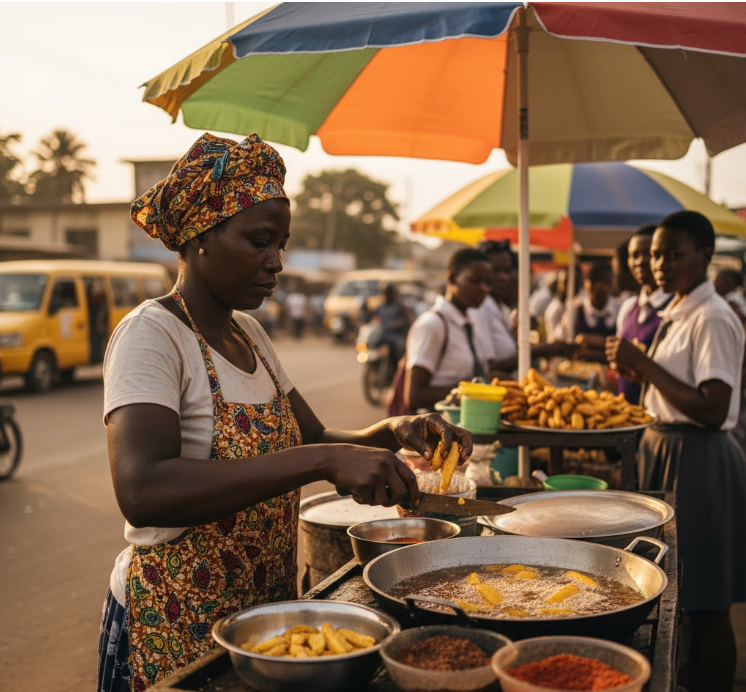Last month, my cousin from Toronto visited Ghana for the first time in fifteen years. On her second day, she turned to me with this bewildered look and said, “Why is everyone greeting everyone? I’ve said ‘good morning’ to more strangers today than I have to my neighbors in five years.” I laughed because she’d just experienced one of those everyday lifestyle habits unique to Ghanaians that catches outsiders off guard.
Living in Ghana means participating in a rhythm of daily life that’s distinctly different from what you’ll find in most parts of the world. These aren’t grand cultural ceremonies or special occasions we’re talking about. I’m talking about the small, everyday things that Ghanaians do without even thinking about them, habits so ingrained in our daily routines that we don’t realize how unique they are until someone points them out.
Whether you’re a Ghanaian living abroad missing home, someone planning to visit or relocate to Ghana, or just curious about how people actually live day-to-day in West Africa, understanding these habits gives you real insight into Ghanaian culture. So let’s explore the quirks, customs, and everyday practices that make life in Ghana distinctly, wonderfully Ghanaian.

The Sacred Ritual of Greetings
Let’s start with what caught my cousin’s attention: the greetings. In Ghana, you don’t just acknowledge people, you greet them properly. And I mean properly. Walking past someone without greeting, especially in the morning, is considered incredibly rude. It doesn’t matter if you’re in a hurry, having a bad day, or don’t know the person. You greet.
The time-specific nature of Ghanaian greetings is fascinating. “Good morning” works until roughly noon, then you switch to “good afternoon,” and eventually “good evening” takes over. But here’s what makes it uniquely Ghanaian: these greetings often extend into full conversations about your night’s sleep, your family’s wellbeing, and your general state of being. A simple “good morning” can turn into a five-minute exchange.
In local languages, greetings become even more elaborate. In Twi, you might hear “Maakye” (good morning), followed by “Wo ho te sɛn?” (how are you?), and the response “Me ho yɛ, wo nso?” (I’m fine, and you?). This back-and-forth creates social bonds and maintains community connections in ways that a quick nod or wave simply can’t achieve.
What’s interesting is how this habit persists even in urban settings. Despite Accra’s hustle and bustle, people still take time to greet neighbors, shopkeepers, security guards, and even strangers they pass regularly. It’s one of those everyday lifestyle habits unique to Ghanaians that keeps the sense of community alive in modern contexts.
Communal Living and Extended Family Dynamics
Privacy in the Western sense? That’s not really how we do things here. Ghanaian daily life revolves around communal living and extended family involvement in ways that can shock people from more individualistic cultures. It’s perfectly normal for multiple generations to live under one roof, and family members routinely show up unannounced, stay for days or weeks, and involve themselves in your business, because that’s what family does.
Your cousin’s friend’s sister needs a place to stay while job hunting? She’s moving in. Your uncle’s visiting from Kumasi? He’s staying indefinitely. Someone’s cooking? They’re making enough for whoever happens to be around. This constant flow of people through homes creates a dynamic living situation where personal space is negotiable and privacy is more of a luxury than an expectation.
The concept of “family meetings” is huge in Ghana. When important decisions need to be made, buying property, choosing a spouse, resolving conflicts, starting a business, the family weighs in. And we’re not just talking parents and siblings. We’re talking aunties, uncles, cousins, and elders who all feel entitled and obligated to offer their opinions. It’s collaborative decision-making on a scale that can feel overwhelming if you’re not used to it.
This communal approach extends to child-rearing too. The whole “it takes a village” saying? That’s literally how it works in Ghana. Your neighbor can discipline your child, your auntie can show up and take your kids for the weekend without much notice, and children often rotate between various family members’ homes. The biological parent is obviously primary, but child-rearing is genuinely a community effort.
Food Culture and Eating Habits
Let me tell you about Ghanaian food habits because they’re something else. First off, we eat with our hands. Not everything, but definitely traditional dishes like banku, fufu, omo tuo, and kenkey. Using your right hand to tear off a piece of fufu, dip it in soup, and eat it isn’t just acceptable, it’s the preferred method. Asking for a spoon marks you as either a foreigner or unnecessarily fancy.
The three-meals structure exists, but with uniquely Ghanaian characteristics. Breakfast might be tea bread (sweet bread with margarine and tea), hausa koko (spicy millet porridge) with koose (bean cakes), or rice water with milk. But here’s the thing: many Ghanaians don’t consider breakfast complete without something substantial. Light continental breakfasts don’t cut it.
Lunch is often the heaviest meal, especially for people working physical jobs or in non-air-conditioned environments. Rice and stew, waakye, jollof, banku and tilapia, these aren’t light lunches. They’re full meals that provide energy for the rest of the day. The concept of a sandwich being a meal? That’s foreign thinking.
Then there’s the evening meal ritual. Many Ghanaian households prepare dinner fresh every evening, none of this meal-prepping-on-Sunday business. Women (yes, it’s still heavily gendered despite changing norms) come home from work and immediately start cooking. The microwave is for reheating, not for primary cooking. Fresh food, prepared daily, is the standard expectation.
Street food culture deserves its own mention. Ghanaians eat out constantly, but not at restaurants in the Western sense. We’re talking roadside food vendors, chop bars, and street corners where women sell everything from fried yam and plantain to grilled tilapia and banku. This isn’t considered lower quality, it’s just how food culture works. Some of the best food you’ll ever taste comes from a wooden structure by the roadside.
Time and Punctuality Perspectives
Okay, let’s address the elephant in the room: “Ghana time” or “African time.” It’s real, it exists, and it’s one of those everyday lifestyle habits unique to Ghanaians that drives Type A personalities absolutely crazy. When someone says an event starts at 2pm, what they really mean is anywhere between 2:30pm and 4pm.
This relaxed approach to time isn’t about disrespect or poor planning. It’s a fundamentally different relationship with time that prioritizes people and processes over rigid schedules. If you’re traveling to an event and run into your uncle on the way, stopping to greet him properly and catch up takes precedence over arriving exactly on time. The journey matters as much as the destination.
Church services exemplify this perfectly. If church is supposed to start at 9am, people begin arriving around 9:15am or 9:30am, and the service doesn’t really kick off until enough people have shown up. Services that are “scheduled” for two hours often run three or four, and nobody bats an eye. You’re there for worship and community, not to watch the clock.
However, there’s nuance here. Business meetings, especially with international partners or in formal corporate settings, increasingly follow stricter time standards. Young professionals are pushing back against extreme lateness. But in social settings, family gatherings, and community events, the relaxed time approach remains standard. Understanding which context demands which approach is part of navigating Ghanaian life successfully.
Language Mixing and Communication Styles
Here’s something that fascinates linguists: Ghanaians code-switch like it’s an Olympic sport. A single conversation might include English, Twi, Ga, and Pidgin, sometimes in the same sentence. “Oh charley, wo ho te sɛn? I dey for the house, just relaxing small.” That’s perfectly normal Ghanaian speech, and everyone understands it without missing a beat.
This linguistic flexibility creates a unique communication style. Certain concepts just hit different in local languages, so even in primarily English conversations, Ghanaians drop in Twi or Ga words because they capture the meaning better. “You got belle?” doesn’t mean you have a stomach, it means you’re pregnant. “Me pe” expresses a desire in ways “I want” somehow doesn’t quite match.
Proverbs and indirect communication are huge parts of everyday conversation. Rather than saying “you’re being foolish,” someone might say “the goat says that if you don’t have sense, at least you should have legs to run.” These proverbs aren’t just colorful language, they’re how Ghanaians teach lessons, offer criticism, and communicate complex ideas without being confrontational.
The volume and expressiveness of Ghanaian communication also stands out. To outsiders, Ghanaians might seem like they’re arguing when they’re just having a normal conversation. Hand gestures are dramatic, voices rise and fall, and interruptions are common and not considered rude. It’s an animated, engaging communication style that values energy and passion over quiet reserve.
Religious and Spiritual Practices
Religion saturates daily life in Ghana in ways that secular Western societies find hard to grasp. Christianity and Islam aren’t just weekend activities, they’re woven into everyday lifestyle habits unique to Ghanaians in fundamental ways. Businesses display religious slogans on their signs: “God’s Time Restaurant,” “Jesus Saves Barbershop,” “By His Grace Provisions Store.” These aren’t just marketing, they reflect genuine faith.
Prayer happens everywhere and often. Before meals, obviously, but also before meetings, before journeys, when making important decisions, when facing challenges. Drivers pray before starting their vehicles. Students pray before exams. Traders pray over their wares in the morning. This constant communication with the divine is just part of the daily routine.
Church attendance on Wednesdays, Fridays, and especially Sundays is massive. Entire families dress up in their finest clothes and spend hours at church. The concept of a quick one-hour service? That doesn’t exist here. Church is an all-morning or all-evening affair involving multiple choirs, long sermons, testimonies, and plenty of energetic worship.
For Muslims, the five daily prayers structure the entire day. When it’s prayer time, business pauses, conversations stop, and people pray. Non-Muslims in Ghana understand and respect this rhythm. It’s just part of the flow of daily life, not an inconvenience or disruption.
Social Visiting and Hospitality
Ghanaians visit. Like, a lot. The practice of dropping by someone’s house unannounced is completely normal and expected. The idea that you need to call ahead, schedule an appointment, or receive an invitation for a casual visit? That’s not how it works here. Family, friends, and even distant acquaintances can show up at your door, and you’re expected to welcome them warmly.
When visitors arrive, no matter how unexpected, you offer them something. Water at minimum, but usually also soft drinks, biscuits, or whatever food you have available. If it’s mealtime, you share your food, even if you hadn’t planned for extra people. Running out of food is embarrassing, so many households routinely cook extra just in case people show up.
These visits can last hours. Nobody’s rushing off after twenty minutes. Visitors settle in, conversations flow, and time passes without anyone feeling the need to leave quickly. In fact, trying to end a visit too soon can be insulting, suggesting the host doesn’t enjoy the visitor’s company.
The flip side is that Ghanaians expect the same hospitality when they visit others. There’s a reciprocal understanding that doors are open, homes are welcoming, and community connections matter more than personal convenience. This creates strong social bonds but can feel overwhelming to people from cultures that value more personal space and privacy.
Conclusion
These everyday lifestyle habits unique to Ghanaians, from elaborate greetings to communal living, from flexible time concepts to spontaneous visiting, create a social fabric that’s remarkably strong and resilient. They prioritize relationships over schedules, community over individualism, and human connection over efficiency.
For Ghanaians living abroad, these habits often persist, creating little pockets of Ghanaian culture in foreign cities. For visitors to Ghana, understanding these customs helps you navigate daily life without constantly feeling confused or inadvertently giving offense. And for anyone interested in different ways of living, Ghanaian daily habits offer a reminder that there are many valid approaches to organizing social life.
The beauty of these habits is that they’re not relics of the past resisting change. They’re living practices that adapt to modern contexts while maintaining their essential character. Young Ghanaians in Accra high-rises still greet their neighbors. Tech professionals working for international companies still stop work to pray. University students living independently still host unexpected visitors and share their food.
What everyday Ghanaian habits have you experienced or heard about? If you’re Ghanaian, which habit do you miss most when you’re away from home? Drop a comment below and let’s celebrate the beautiful quirks that make Ghanaian daily life so uniquely special.
Frequently Asked Questions
Why do Ghanaians greet everyone they meet?
Greetings in Ghana are fundamental social obligations that maintain community bonds and show respect. Not greeting someone, especially elders or people you encounter regularly, is considered extremely rude and suggests hostility or poor upbringing. Greetings acknowledge shared humanity and social connection, serving as daily affirmations of community membership. This practice extends beyond close relationships to include neighbors, vendors, security guards, and even strangers you pass frequently. The elaborate nature of Ghanaian greetings, often including inquiries about family and wellbeing, reinforces social networks that form the foundation of community life and mutual support systems.
Is it really acceptable to visit someone without calling first in Ghana?
Yes, unannounced visiting is completely normal and expected in Ghanaian culture. While this practice is gradually changing in some urban areas among younger professionals, it remains standard in most contexts. Family members especially can show up without notice and expect warm hospitality. This reflects communal values where homes are considered open to community rather than private sanctuaries. The expectation works both ways, hosts must welcome unexpected visitors graciously, and visitors understand they might arrive when it’s inconvenient but trust that hospitality will be extended regardless. Many Ghanaian households routinely prepare extra food specifically to accommodate unexpected visitors.
Why is food such a big part of Ghanaian hospitality?
Food represents care, welcome, and social connection in Ghanaian culture. Offering food to visitors demonstrates that you value their presence and consider them worthy of sharing resources with. Refusing offered food can be insulting unless you have a very good reason, as it suggests rejection of the host’s hospitality. Meals are communal experiences meant to be shared rather than individual activities. The importance of food in Ghanaian hospitality also reflects traditional values where sharing scarce resources built community solidarity and mutual obligations. Even in modern contexts where food is more abundant, these symbolic meanings persist, making food-sharing a crucial element of social interaction.
How do Ghanaians balance modern life with traditional customs?
Ghanaians navigate modernity and tradition through selective adaptation and context-switching. In formal business settings with international connections, punctuality and Western professional norms increasingly apply. In family and community contexts, traditional practices remain strong. Young Ghanaians blend both worlds, using technology while maintaining communal values, pursuing individual careers while respecting family obligations. This balance isn’t always easy and creates tensions, but most Ghanaians don’t see it as choosing between tradition and modernity but rather integrating both. The result is a distinctly Ghanaian modernity that incorporates global influences while maintaining cultural identity and core social values.
What should visitors know about Ghanaian daily customs?
Visitors should understand that greetings are essential, always greet people you encounter, especially in the morning. Accept offered food and drinks graciously unless you have dietary restrictions, refusal can seem rude. Expect less personal space and privacy than in Western contexts. Be patient with flexible time concepts in social settings while maintaining punctuality for formal business. Show respect for religious practices, whether Christian or Muslim. Use your right hand for eating, giving, and receiving, the left hand is considered unclean. Ask permission before photographing people. Dress modestly, especially when visiting rural areas or religious sites. Most importantly, embrace the warmth and openness of Ghanaian hospitality with genuine appreciation.
Sources:
- Ghana Tourism Authority – Culture and Customs – https://visitghana.com/culture/
- Centre for National Culture Ghana – Cultural Practices – https://www.ghanaculture.gov.gh
- Encyclopedia of African Culture – Ghana Traditions – https://www.africancultureencyclopedia.com/ghana
